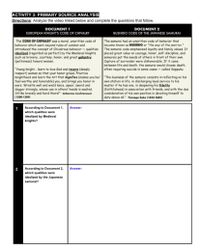Question

Transcribed Image Text:ACTIVITY 3: PRIMARY SOURCE ANALYSIS
Directions: Analyze the video linked below and complete the questions that follow.
DOCUMENT 1
DOCUMENT 2
EUROPEAN KNIGHT'S CODE OF CHIVALRY
BUSHIDO CODE OF THE JAPANESE SAMURAI
The CODE OF CHIrVALRY was a moral, unwritten code of
behavior which went beyond rules of combat and
introduced the concept of Chivalrous behavior – qualities
idealized (regarded as perfect) by the Medieval knights
such as bravery, courtesy, honor, and great gallantry
(politeness) toward women.
The samurai had an unwritten code of behavior that
became known as BUSHIDO or "the way of the warrior."
The samurai code emphasized loyalty and family values. It
placed great value on courage, honor, self-discipline, and
samurais put the needs of others in front of their own.
Capture of surrender were dishonorable. If it came
between life and death, the samurai would choose death,
often requiring suicide in some cases – called Seppuku.
"Young knight. learn to love God and revere (deeply
respect) women so that your honor grows. Practice
knighthood and learn the Art that dignifies (makes you be/"The business of the samurai consists in reflecting on his
feel worthy and honorable) you, and brings you honor in
wars. Wrestle well and wield lance, spear, sword and
dagger strongly, whose use in others' hands is wasted.
Strike bravely and hard there!" -Johannes Liechtenauer
(1300-1389)
own station in life, in discharging loyal service to his
master if he has one, in deepening his fidelity
(faithfulness) in association with friends, and with the due
consideration of his own position in devoting himself to
duty above all." -Yamaga Soko (1622-1685)
According to Document 1,
Answer:
1
which qualities were
idealized by Medieval
knights?
According to Document 2,
which qualities were
idealized by the Japanese
2
Answer:
samurai?
Expert Solution
This question has been solved!
Explore an expertly crafted, step-by-step solution for a thorough understanding of key concepts.
This is a popular solution
Trending nowThis is a popular solution!
Step by stepSolved in 3 steps
